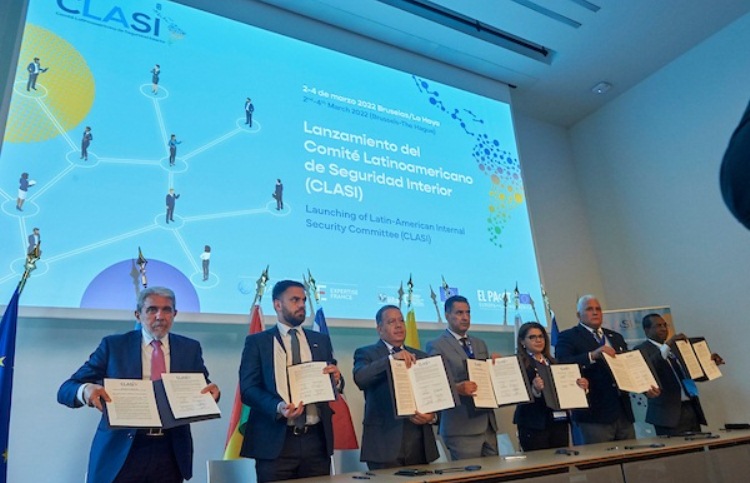The Diplomat
Interior ministers and deputy interior ministers from seven Latin American countries have signed a political declaration for the formation of the Latin American Committee on Internal Security (CLASI), an initiative promoted by the EU under the leadership of the Spanish public entity Fundación Internacional y para Iberoamérica de Administración y Políticas Públicas (FIIAPP).
Representatives of Argentina, Bolivia, Ecuador, Costa Rica, El Salvador, Panama and the Dominican Republic have signed a political declaration in Brussels that marks the beginning of the creation of CLASI, the body that will help coordinate the actions of these seven countries to address the region’s security problems, according to FIIAPP, a state entity linked to Spanish Cooperation.
CLASI is an instance of political and technical dialogue between those responsible for security policies in Latin American countries. Its objective is to bring together those responsible in this field to define strategies and articulate public policies against transnational organized crime. The European program EL PAcCTO, led by FIIAPP together with Expertise France, will accompany the process of creating CLASI in the elaboration of work plans and the definition of priorities, strategies and policies.
The Director for Latin America and the Caribbean of the European Commission’s Directorate General for International Partnerships, Jolita Butkeviciene, stressed that the signing of this document means “an important milestone for Latin American countries, but also for the European Union, because we are strengthening our role as a strategic ally in the areas of justice and peace”. Through CLASI, the countries involved aim to “offer Latin America an effective partnership that strengthens the rule of law and the fight against transnational organized crime in all its dimensions, and is based on shared values through common political priorities,” she said.
Also present at the signing was the Director for the Americas of the European Union’s External Action Service, Javier Niño, who stated that “the signing of the declaration is a reflection of Latin America’s desire to engage with Europe to achieve greater security for all. We know that security challenges are global and the only way to tackle them is to achieve regional and international cooperation”.
For his part, the Minister of Security of Argentina, Aníbal Fernández, whose country will assume the first rotating presidency of CLASI, said that “the reality is that we need both Europe and the rest of America because we have similar problems. We can help each other. With this signature, he added, the seven Latin American countries are committed to “promoting close coordination of our actions, national strategies and public policies in the fight against transnational organized crime, as well as encouraging the involvement of other Latin American states”.





